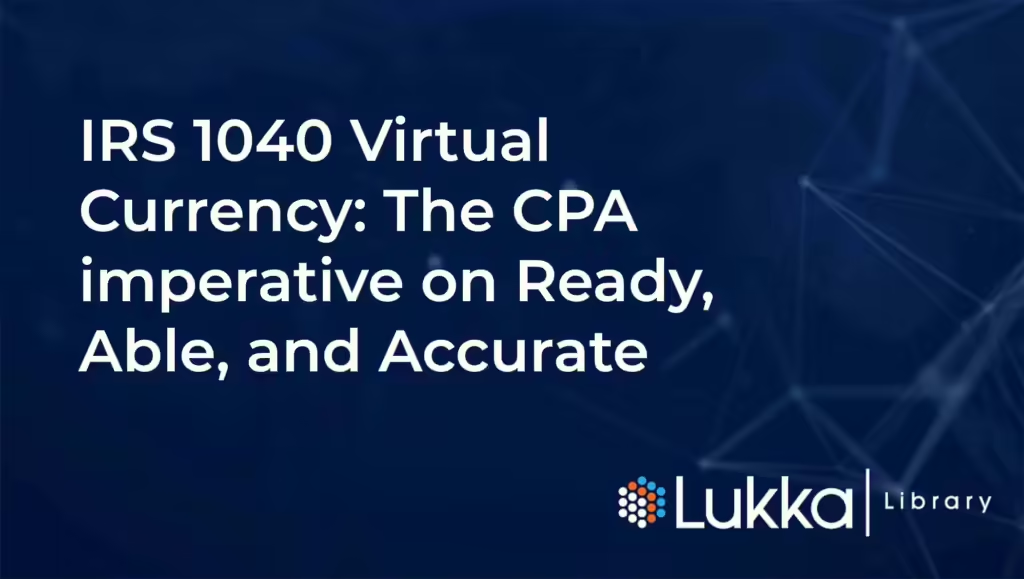The crypto asset ecosystem has undergone enormous expansion in the past few years, but while investors and entrepreneurs have rushed in, regulatory bodies have lagged behind. With basic questions about tax obligations and reporting standards often failing to receive straightforward answers, investors have often been forced into guesswork. For the first time in five years, though, the IRS has issued guidance on the tax treatment of virtual currencies, providing investors with an extensive Q&A section and a ruling on the tax consequences of hard forks to illustrate reporting expectations.
Turning Up The Heat on Compliance
A clear message pervades these documents: the IRS is increasing the level of scrutiny it applies to crypto transaction reporting, and it is adopting a more muscular approach to enforcing compliance. In the press release announcing the updates, the IRS closed by stating that it is “actively addressing potential non-compliance in [transaction reporting and tax payment] through a variety of efforts, ranging from taxpayer education to audits to criminal investigations.” With clearer standards and consequences now in place, investors must ensure that they are equipped with accurate, market-wide data to avoid potentially liability which also exists for those who are in the business of providing auditing, accounting and tax services. CPA’s are held to extremely high standards given the importance of their roles so adhering to new regulations and guidance is critical to their business so that they do not put themselves at risk, especially as new asset types, such as crypto assets, become material for organizations.
Determining Fair Market Value
One of the themes that pervade the IRS’s guidance is the importance of correctly determining the fair market value (FMV) of cryptocurrencies to ensure accurate reporting. Determining FMV is straightforward for transactions facilitated by exchanges, but far more complicated for peer-to-peer transactions and airdrops.
When an off-chain transaction is facilitated by an exchange, the FMV of the transaction is simply the amount the cryptocurrency was trading for on that exchange at the moment the transaction occurred. For peer-to-peer transactions, though, determining FMV can be a much more involved process, and in the absence of a set exchange rate, the IRS has indicated that it will accept “the value as determined by a cryptocurrency or blockchain explorer that analyzes worldwide indices of a cryptocurrency and calculates the value of the cryptocurrency at an exact date and time.” An extensive system of connectors that link to, and pull data from, indices and exchanges, then, is required to meet the IRS’s gold standard. With 70 API connections to exchanges, custodians, OTC desks, and banks, Lukka is able to enrich and reconcile this massive data set to deliver the most accurate valuation in the industry. In the process, we even developed our own proprietary pricing service called Lukka Prime.
Navigating Forks
The problem of accurately reporting FMV is complicated further by hard forks. When cryptocurrencies go through a hard fork (a protocol change which results in a permanent diversion in the legacy distributed ledger), investors can receive new cryptocurrencies that emerge as a result of the diversion in the ledger. When these new cryptocurrencies are distributed to ledger addresses, the IRS has ruled that investors incur tax liability for income based on the new cryptocurrency’s FMV at the moment the recipient assumes dominion and control. The new cryptocurrency, though, may initially appear on only a handful of exchanges, so to accurately report income to the IRS, investors must maintain access to market-wide data.
Avoiding Exposure
The IRS’s guidance provides some much needed clarity for crypto investors, but it also makes clear the consequences for inaccurate reporting. Whether you are an investor or a CPA, readiness is key. If you are unable to respond to the new 1040 virtual currency question, there may be penalties. For individuals, your returns could be inaccurate and for CPA’s, your inability to properly assist clients in completing and calculating virtual currency-related tax could force them to go elsewhere for advice. Inaccuracies in calculating taxes owed on virtual currency activity for clients, individually or replicated across an entire client base, especially if they are material, presents a risk to tax preparers and CPAs. To avoid unnecessary exposure, investors should work with CPA’s who have partnered with a data services provider like Lukka to receive up-to-date pricing information and historical data.
The potential liability for being unprepared and using inaccurate data is tremendous and the costs of avoiding it are low, so the path forward is clear for shrewd investors and the professionals they rely on for accurate tax reporting.



